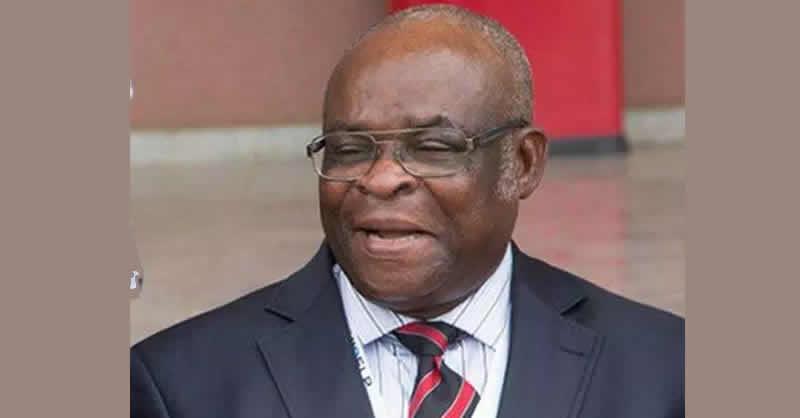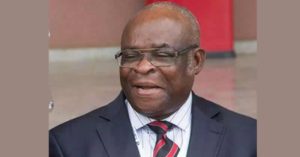The allegation of false and non-assets declaration against Justice Walter Onnoghen, came to a dramatic end yesterday at the Code of Conduct Tribunal (CCT).
Onnoghen watched helplessly as the tribunal headed by Mr. Danladi Umar, a non-judicial officer, found him guilty of the six-count charge brought against him by the Federal Government through the Code of Conduct Bureau (CCB).
The tribunal in a unanimous judgment also ordered the removal of Onnoghen as Chief Justice of Nigeria (CJN) and chairman, National Judicial Council (NJC). He was also barred from holding public office for 10 years for contravening the CCB laws in his Assets Declaration Form. Onnoghen will, in addition, forfeit to the Federal Government, various sums of money found in his five bank accounts with Standard Chartered Bank, having failed to declare them.
Umar said: “The admission by the defendant in his own handwriting that he forgot to declare the five bank accounts in his asset Declaration Form CCB001 amounts to a partial confession that the defendant has breached the provision of the CCB/CCT Act as it amounts to refusal to declare assets.
“In the present case, hard facts have been adduced by the prosecution to establish that the defendant is in crystal clear breach of the CCB provisions, and the prosecution has therefore discharged the burden placed on it by law. “Having examined the case of the prosecution against the defendant, this tribunal has come to a conclusion that the defendant falsely declared his assets and he is hereby found guilty of contravention of Section 23 of the CCB/CCT Act.
“It is hereby ordered that the defendant be removed as the Chief Justice of Nigeria and as chairman of the National Judicial Council. He is also barred for 10 years from holding public office while the money in the five undeclared bank accounts is hereby seized, confiscated and forfeited to the Federal Government, having been illegally acquired, since the defendant did not disclose their sources.”
Onnoghen will forfeit to the Federal Government N26.8 million, $137,700 and £13,730, found in his domiciliary accounts with Standard Chartered Bank. The charges note that the accounts were afloat since 2009.The Federal Government filed the charges on January 10, 2019. It later called three witnesses to establish its case.
At the resumed sitting yesterday, the atmosphere appeared normal. There was no heavy security presence in and around the tribunal premises. Not even the usual solidarity of Senior Advocates of Nigeria was observed. There was however an ominous sign that all was not well. The premonition of some junior lawyers could be read from their moods, even though Onnoghen sat unruffled in the dock. When the matter was stood down till noon, apprehension heightened. No one could predict what the tribunal had in stock for the number one judicial officer.
Umar walked into the courtroom few minutes after 12:00 p.m. with the other two members of the panel. Although all eyes were fixed on them for a telltale sign, they betrayed no expression. But before delving into the substantive matter, Umar delivered ruling on two separate applications filed at the beginning of the trial by Onnoghen. Although the tribunal should have ruled on them before going ahead with the trial, Umar insisted they would run simultaneously with the main case.
The two motions were challenging the jurisdiction of the tribunal to try Onnoghen as well as the competency of the chairman to preside over the trial, having been accused of corrupt practice and charged to court for the same. But Umar in the judgment overruled Onnoghen’s claim that he could not be tried by the tribunal on the account of his being a serving judicial officer, whose misconduct, if any, could only be investigated by the NJC, which also has the power to mete out any punishment to him.
The tribunal chairman contended that Onnoghen was arraigned before him as a public officer and not as a judicial officer, and as such the tribunal was not under the obligation of the NJC. Umar also held that he could not step down from the trial because the EFCC has in two separate letters exonerated him from the bribery issue after a thorough investigation.
According to Umar, the EFCC on November 1, 2018 withdrew the case against him.
The CCT boss also said that the issue of bias raised by Onnoghen against him was not established as required by law.
Speaking shortly after the conviction, the leader of Onnoghen’s defence team, Mr. Okon Nkanu, stated that the judgment was premeditated and vowed to engage every judicial process and hierarchy to secure justice for Onnoghen. He said: “This day, we have heard that the CJN has been convicted and sentenced. The conviction is out of order, unconstitutional and a breach of fair hearing because before this day, on January 23, the same judgment has been passed.
“Removing the CJN without a fair hearing was premeditated. Judgment has been passed before today. So, today’s judgment was just a formality and we hold a view that the tribunal has not only breached the constitution of Nigeria; it has also breached the fundamental principles of natural justice, equity, fair hearing and good conscience. “Onnoghen has been convicted for an offence that was never charged. This is an erosion of the fundamental principle of our constitution and some questions need to be answered.”He asked: “Why is it that a due course of justice was not allowed to flow? Why was judgment passed on January 23 before today? Why was he removed as the CJN, even after he has tendered his retirement voluntarily and the NJC has taken a position? Why has the tribunal gone ahead to pass judgment in total disregard of the independence of the NJC and in total disregard of the power of the Senate in this matter?”
But the prosecution, led by Musa Ibrahim Umar, disagreed. “The judgment has been given and we are okay with it. That is all I can say for now,” he said with a smile.
Onnoghen meanwhile has filed a 16-ground appeal. According to him, “The lower tribunal erred in law when it refused to recuse itself from the proceedings in view of the open declaration by the chairman of the tribunal that he is only accountable to the president who appointed him because he is not a judicial officer.
“The lower tribunal erred in law and acted without jurisdiction when it ordered that the assets of the appellants be confiscated and thus occasioned a miscarriage of justice.” The appellant also insisted that the tribunal erred in law when it placed on the defendant the burden of proving his innocence in violation of Section 36(5) of the 1999 Constitution and Section 135 (1) of the Evidence Act, 2011 and therefore urged the appeal court to set aside the conviction of the appellant among other prayers.
CCT convicts, sacks Onnoghen as Chief Justice






